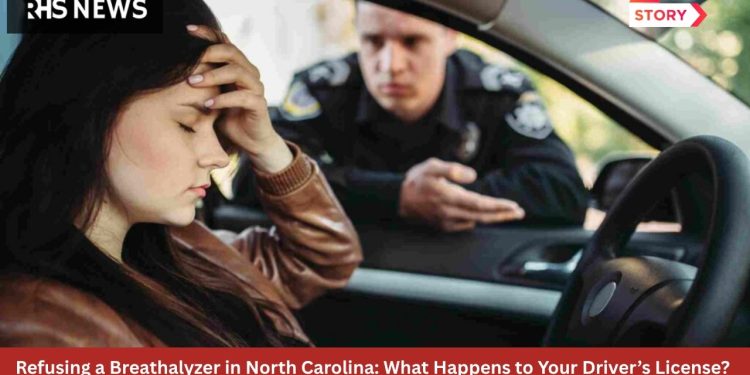Driving under the influence of alcohol or drugs is a serious offense across the United States, with each state enforcing strict laws to deter impaired driving and protect public safety. In North Carolina, the implied consent law plays a central role in how law enforcement and the courts handle suspected driving while impaired (DWI) offenses.
This article provides a comprehensive, in-depth look at what happens if you refuse a breathalyzer test in North Carolina, with a particular focus on the significant consequences for your driver’s license. We’ll explore the legal foundations, the immediate and long-term penalties, appeal options, insurance and employment impacts, and practical guidance for those facing this situation.
Implied Consent: The Legal Foundation
In North Carolina, every licensed driver enters into an agreement the moment they take to the roads—an agreement established by the implied consent law. This means that, by operating a motor vehicle in the state, you are automatically consenting to chemical testing (breath, blood, or urine) if a law enforcement officer has reasonable grounds to believe you’ve been driving while impaired. The law is designed to support DWI enforcement and reduce alcohol-related accidents by making it difficult for drivers to avoid testing when suspected of impairment.
It’s important to distinguish between a preliminary breath test (PBT), typically conducted at the roadside with a portable device, and the official evidentiary breath test conducted at the station or with a more precise machine. Refusing a PBT does not trigger automatic administrative penalties, though it may influence the officer’s decision to arrest you. However, once you are lawfully arrested and asked to submit to the official chemical test, refusal carries steep consequences.
What Happens If You Refuse?
Immediate Administrative Consequences
If you refuse the official breathalyzer test after being arrested for DWI, your driver’s license will be immediately revoked for 30 days by the North Carolina Department of Motor Vehicles (DMV), regardless of whether you are later convicted of DWI. This is often referred to as a “civil revocation,” and it is separate from any criminal penalties you might face.
After this initial 30-day revocation, the DMV will typically suspend your license for a full year if you are subsequently convicted of an implied consent violation, which is the formal legal consequence for refusing testing. In some cases, this suspension may happen automatically even before a criminal conviction, simply due to the refusal itself. This suspension is “administrative” in nature—it is triggered by the refusal, not by a criminal conviction.
Additional Penalties
While administrative penalties are immediate, refusing a breathalyzer can also affect your criminal case. Prosecutors may use your refusal as evidence of “consciousness of guilt,” suggesting that you declined the test because you knew you were over the legal limit. This can make it harder to defend yourself in court.
Moreover, if you are ultimately convicted of DWI in addition to your refusal, you could face enhanced criminal penalties, including longer license suspensions, higher fines, and even jail time, depending on the specifics of your case and prior record. North Carolina uses a structured sentencing system for DWI, and a refusal can be treated as an aggravating factor.
Multiple Refusals
If you have refused a breathalyzer before, the penalties become even more severe. A second refusal within seven years can lead to a four-year license revocation—far longer than the standard one-year suspension for a first refusal. Repeat refusals are taken seriously by the courts and the DMV, signaling a pattern of non-compliance with the law.
Limited Driving Privileges and Appeals
After the initial 30-day revocation, some drivers may be eligible for limited driving privileges, such as driving to work, school, or medical appointments. However, for those who refuse the breathalyzer, no limited privileges are available for the first six months of the suspension. This means you cannot legally drive for any reason during that period.
You do have the right to request a hearing to challenge the license suspension. These hearings are held by the DMV and require strict adherence to timelines and procedures. If you win the hearing, the suspension may be overturned, but this is rare and often requires skilled legal representation.
The Admissibility of Refusal in Court
North Carolina law explicitly allows prosecutors to introduce evidence that you refused a breathalyzer test at trial. Jurors are permitted to draw inferences from your refusal, which can be damaging to your defense. While refusing the test does not equal an admission of guilt, it does eliminate the possibility of presenting a low or zero blood alcohol concentration (BAC) as evidence in your favor. This can make defending against a DWI charge more difficult, especially if other evidence of impairment exists.
Effect on Insurance and Employment
A refusal to submit to a breathalyzer is recorded on your driving record. Even if you are not convicted of DWI, this record can have serious real-world consequences. Insurance companies often view a refusal as negatively as a DWI conviction, leading to substantially higher premiums or even denial of coverage. Employers who require a clean driving record may also be reluctant to hire or retain someone with a refusal on their record, especially for jobs involving driving.
What Are Your Rights During a DWI Stop?
It’s important to know your rights during a DWI stop. You do not have the right to consult with an attorney before deciding whether to take the breathalyzer test—your decision must be made at the scene. You do, however, have the right to select a witness to observe the testing process, but the test cannot be delayed more than 30 minutes for this purpose. If you do refuse, it is crucial to seek legal counsel immediately, as the consequences are significant and time-sensitive.
Is It Ever a Good Idea to Refuse?
Given the severe consequences, it’s rarely advantageous to refuse a breathalyzer in North Carolina unless you have a strong legal strategy in mind. While refusal deprives the prosecution of direct evidence of your BAC, it also triggers automatic penalties and can be used against you in court. Skilled DWI defense attorneys may be able to challenge the legality of the stop or the administration of the test, but these defenses are complex and depend on the specific facts of your case.
Practical Steps If You Refuse
If you refuse a breathalyzer, here are some practical steps to consider:
-
Contact an attorney immediately. An experienced DWI defense lawyer can advise you on your rights, help you request a DMV hearing, and represent you in court.
-
Be prepared for the consequences. Understand that your license will be suspended, and plan accordingly for transportation needs.
-
Document everything. Write down details of the stop, the officer’s behavior, and any witnesses, as this information may be critical to your defense.
-
Consider the long-term impact. A refusal can affect your insurance, employment, and future encounters with law enforcement.
The Big Picture: Safety, Enforcement, and Individual Rights
North Carolina’s strict stance on breathalyzer refusal is part of a broader effort to reduce drunk driving and its tragic consequences. The implied consent law aims to remove ambiguity around testing and ensure that those suspected of impaired driving face clear, consistent penalties. For individuals, this means that refusing a breathalyzer is not a risk-free choice—it comes with almost certain loss of driving privileges, potential criminal consequences, and lasting effects on your record.
Conclusion
Refusing a breathalyzer in North Carolina triggers immediate and severe administrative penalties, most notably the loss of your driver’s license for at least one year, regardless of whether you are convicted of DWI. The refusal can also be used against you in court, making it harder to defend against criminal charges. Limited driving privileges are unavailable for the first six months of the suspension, and a refusal can negatively impact your insurance and employment prospects. While you technically have the right to refuse, exercising that right comes with significant, lasting consequences. If you find yourself facing this decision, seeking knowledgeable legal counsel as soon as possible is your best chance to protect your rights and mitigate the fallout.









